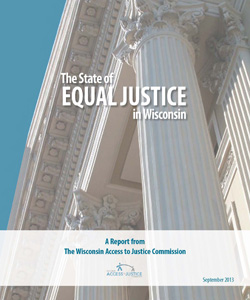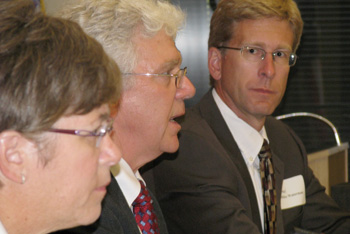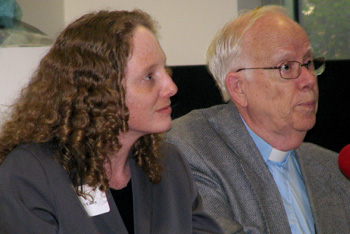 Oct. 16, 2013 – More funding for civil legal services, increased support for pro bono efforts, and an expanded role for nonlawyers are a few of the recommendations in a recent report released by the Wisconsin Access to Justice Commission.
Oct. 16, 2013 – More funding for civil legal services, increased support for pro bono efforts, and an expanded role for nonlawyers are a few of the recommendations in a recent report released by the Wisconsin Access to Justice Commission.
The Access to Justice Commission was created in 2009 by the Wisconsin Supreme Court at the request of the State Bar of Wisconsin to foster expanded access to the justice system for unrepresented, low-income Wisconsin residents.
Kevin Magee, an attorney at Legal Action of Wisconsin, rightly explains that in many situations, access to justice means more than the freedom to participate in proceedings.
“It means having effective participation in a proceeding. In our system, that generally means having a trained advocate. Allowing someone to be present in a proceeding that they don’t understand is not access to justice. It might be access to a courtroom, but it’s not access to justice,” Magee said.
The report, “The State of Equal Justice in Wisconsin,” issued last month contains key findings and recommendations for improving equal access to the justice system. The report is based on public input the Commission gathered in 2012 through a series of six public hearings held in Green Bay, Eau Claire, Milwaukee, Madison, La Crosse, and Wausau.
The Commission heard testimony from Wisconsin residents who came from varied backgrounds and experiences: judges; court commissioners; members of the public; county clerks; volunteer attorneys; law schools; and representatives of public service, nonprofit, and religious organizations.
In addition, leaders from the judiciary, state and county government, the State Bar of Wisconsin, business, religious groups, foundations, legal aid programs, and social services organizations joined Commission members on the panel at each hearing.

(From left) Hon. Molly GaleWyrick, Polk County Circuit Court, Gregg Moore, Wisconsin Access to Justice Commission, and Michael Waterman, State Bar of Wisconsin Board of Governors, on the hearing panel in Eau Claire.

Sherry Coley, State Bar of Wisconsin Board of Governors, and Fr. Bill Ribbens, Wisconsin Access to Justice Commission, listen to testimony in Green Bay.
What Did the Commission Find?
Witnesses described a sometimes chaotic and often dispiriting experience of trying to find the legal help that they needed to obtain judicial protection for themselves or a family member in dangerous situations when they had no means to hire a lawyer.
Legal services agencies described the near skeletal remains of our state’s legal aid system in which funding and staff cuts have resulted in no meaningful access to justice for low-income seniors, abuse victims, consumers, tenants, and others in vast areas of the state.
Judges and court commissioners testified about the difficult position they find themselves in as impartial decision makers who are regularly faced with one or both parties in a case who don’t have lawyers, can’t afford a lawyer and are clearly unable to adequately represent themselves or even understand the legal proceedings.
Volunteer attorneys, law schools, court staff, and others described what they have done to provide some measure of help through a variety of free legal clinics, online forms, and legal resource centers.
For the most vulnerable Wisconsin residents who lack the means to help themselves and who need more than brief legal advice or help with a form to make any headway in our legal system, there are few options for obtaining the more extensive legal help that they need.
Five fundamental themes emerged from the testimony the Commission heard:
The need for civil legal assistance is increasing at a time when resources are decreasing;
A continuum of services is needed from legal information to full representation;
The effects on our justice system of the growth in self-represented litigants who often don’t understand or can’t navigate the court system;
Legal aid services for low-income individuals are a cost-effective solution; and
Concerted action by a broad range of institutions and individuals inside and (especially) outside the legal system is necessary for any meaningful change to happen.
 Gregg Moore is the president of the Access to Justice Commission.
Gregg Moore is the president of the Access to Justice Commission.
The Commission’s Recommendations
Based on the public hearings, the Commission made a series of nine recommendations in its report, including some – such as more funding for civil legal services, increased support for pro bono efforts and an expanded role for nonlawyers – that echo recommendations in the State Bar of Wisconsin’s 2007 “Bridging the Justice Gap: Wisconsin's Unmet Legal Need” report.
The Commission’s report also recommends an expansion of the legal resource center model to more counties, more appointments of counsel in appropriate civil cases, coordinated public education efforts, a greater role for interpreters outside the courtroom, replicating successful mediation efforts, and additional research on the economic and personal benefits that result from increased access to legal help for low income residents.
As the Commission notes in the report:
“Access to justice is not a legal issue. It is a fundamental principle that has guided our justice system since its inception. We all have a responsibility to ensure equal access to justice and fair treatment for Wisconsin’s residents when they seek redress for civil legal needs. Until we join together and take action as a society, the challenges addressed in this report and the costs that they impose will only increase.”
Tell Us!
What can Wisconsin lawyers do to improve access to justice? Comment below.
What’s Next?
The Commission will continue to serve as a catalyst to bring together the groups that can help make each of these a reality in Wisconsin and will monitor their progress. At the Madison hearing, Jefferson County Circuit Court Judge William Hue summarized the choice before us:
“[W]hat do we as custodians in the greatest system of justice in the world want justice to look like to all participants? And once we figure out what justice should look like, assuming that look equates to fairness and equality and I think we can all agree to that. Shouldn’t we ensure that the system actually be what we want it to look like?”
We have a great legal system, committed volunteer and staff resources, community organizations that want to help and many elected officials who understand that our communities are stronger when access to justice is available to all. We have what it takes to move Wisconsin forward towards equal justice for all. Whether we will each do our part or not is up to all of us.
